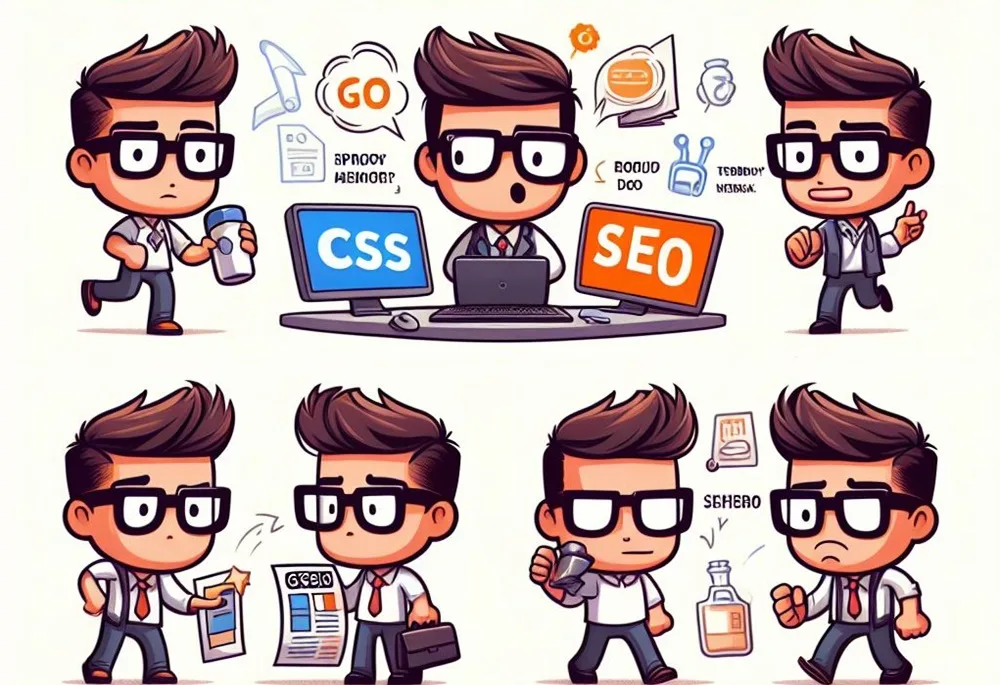The Most Common SEO Issues

Various SEO issues can significantly lead to decreased website traffic and lower rankings.
These issues range from technical glitches such as slow loading times and broken links, to content-related problems like keyword stuffing and low-quality content.
Understanding and addressing these SEO issues is crucial for improving a website’s search engine ranking and overall digital presence.
In this article, we’ll discuss some common SEO issues that many websites face today and provide actionable tips on how to address them. So let’s get started.
What Are SEO Issues?
SEO issues are any factors that could affect how easily search engine crawlers can access, index, and rank a website.
These might include broken links, duplicate content, low keyword optimization, poor site structure, and slow response times.
In some cases, these issues can be caused by coding errors or incorrectly implemented changes, while in others they can be caused by neglecting to stay up-to-date with search engine algorithms.
Fixing SEO issues is a vital part of the holistic SEO approach, which aims to ensure that a website is technically sound, user-friendly, and relevant to search engine users.
Why It’s Important to Solve SEO Problems?
If you have SEO issues on your site, these can lead to poor rankings in search engine results pages.
This, in turn, can lead to fewer visitors and lower conversions, which can have a huge negative impact on your business. Therefore, it’s essential to identify and resolve any SEO issues on your website as soon as possible.
Moreover, search engine algorithms are constantly evolving, so even if your website is currently performing well in terms of SEO, it’s important to regularly monitor and address any potential issues that may arise. This will help keep your site optimized for both users and search engines.
Common SEO Problems
Let’s take a look at the list of common SEO issues that you might encounter on your site:
Technical SEO Issues
1. Broken Links
Dead links on your site can lead to a poor user experience and will prevent search engine crawlers from discovering new content.
2. Duplicate Content
If search engine crawlers find too much duplicate content on your site, it can lead to lower rankings.
3. Page Speed
Slow page loading times can create a poor user experience, as well as reduce your ranking potential.
4. Mobile-Friendliness
Search engines now prioritize mobile-friendly websites, so if your site is not optimized for mobile devices it could affect your rankings.
5. Mixed Content
Using both secure (HTTPS) and non-secure (HTTP) content on the same page can cause confusion for search engine crawlers and lead to lower rankings.
6. Canonicalization Issues
Canonicalization is the process of assigning one version of a page as the main one. If you have multiple versions of the same page, this can lead to duplicate content issues and lower rankings.
7. Caching Issues
If your server is not properly caching content, it can lead to slower page loading times and a poor user experience.
8. Broken Sitemap
Search engine crawlers rely on your sitemap to crawl and index content, so if it’s broken, they won’t be able to access your content.
9. Inaccessible website
An inaccessible website can prevent users with disabilities from accessing your content and also impact your SEO rankings.
As accessibility and SEO are closely related, it’s important to make sure your site is accessible to all users in terms of design, content, and functionality.
Want More Traffic?
Enterprise SEO Issues
1. Poor Internal Linking
If your site doesn’t have enough internal links, it can lead to lower rankings and prevent search engine crawlers from discovering new content.
Therefore, one of the main technical SEO issues an enterprise’s in-house SEO team should address is ensuring a strong internal linking structure.
2. Low Keyword Optimization
In order to rank well on search engine results pages, you need to have relevant keywords and phrases that are properly optimized for your content.
3. Poor User Experience
If visitors to your website have a poor user experience due to slow page loading times, confusing navigation, or a lack of relevant content, this can lead to lower rankings.
4. Link Building Issues
If you don’t have enough quality backlinks pointing to your website it’ll be tough, especially with competitive niches, to rank well on search engines. Building a strong backlink profile is crucial for SEO success.
5. Cannibalization
If you have multiple pages targeting the same keywords, this can lead to lower rankings and reduced visibility for each of those pages.
6. Waste of Crawl Budget
If you have too many pages that are not relevant, this can waste your search engine crawl budget and lead to lower rankings.
On-page SEO Problems
1. Missing Metadata
Search engine crawlers rely on metadata to understand the content of a page, so if it is missing or incorrect, it can lead to lower rankings.
2. Poor URL Structure
If your URLs are too long and contain irrelevant words, this can reduce the visibility of your pages in search engine results.
3. Lack of Quality Content
If your content is not relevant or doesn’t provide enough value, this can lead to lower rankings and fewer visitors.
4. Non-optimized Images
If you don’t optimize your images with relevant keywords, this can lead to lower rankings and less visibility in image searches.
5. Non-Optimized Headings
Headings are a great way to help search engine crawlers understand the content of a page, so if they are not properly optimized it can lead to lower rankings.
6. Overuse of Keywords
If you overuse keywords in your content, this can lead to lower rankings and even penalties from search engine crawlers.
Mobile SEO Problems
1. Incompatible Content
If your content is not optimized for mobile devices, this can lead to a poor user experience and lower rankings in mobile search results.
2. Slow Loading Pages
Mobile devices tend to have slower loading speeds, so if your pages take too long to load, this can lead to a poor user experience and lower rankings.
3. Lack of Mobile Redirects
If you don’t have mobile redirects set up, this can lead to lower rankings and fewer visitors from mobile searches.
4. Design Issues
If your website is not designed to be responsive or usable on mobile devices, this can lead to lower rankings and a poor user experience.
This could especially happen in headless CMSs, where the content may not be optimized for mobile devices.
5. Poor Navigation
If your navigation is confusing or difficult to use on mobile devices, this can lead to fewer visitors and lower rankings.
Cloudflare SEO Problems
1. Hosting Issues
Many times there is a clash between the hosting service and Cloudflare, which can lead to slower page loading times and a poor user experience.
2. Caching Issues
Caching issues are common when using Cloudflare if the settings are not defined correctly. If your content is not properly cached, this can lead to slower page loading times and a lower ranking in search engine results.
3. Security Issues
Security Issues could happen with Cloudflare, and If your website is not properly secured, this can lead to a poor user experience and lower rankings due to security vulnerabilities.
4. Integration Issues
If your website is not integrated with Cloudflare properly, this can lead to fewer visitors and lower rankings.
5. Site Speed Issues
If your website has slow page loading times, this can lead to a poor user experience and lower rankings.
6. DNS Issues
If your DNS is not configured correctly (which happens often), this can lead to lower rankings and fewer visitors.
Shopify SEO Problems
1. Duplicate Product Content
Shopify stores can sometimes create multiple pages with the same content which can lead to lower rankings and fewer visitors.
2. Poor URLs
Shopify store’s URLs can be too long or contain irrelevant words, this can reduce the visibility of your pages in search engine results.
3. Missing Metadata
Search engine crawlers rely on metadata to understand the content of a page, so if it is missing or incorrect, this can lead to lower rankings.
4. Non-Optimized Headings
Shopify stores sometimes create duplicate headings in the code, which is not the best practice for SEO and can lead to lower rankings that is another reason why managing Shopify SEO requires experienced SEO services.
5. Poor Navigation
If your Shopify store’s navigation is confusing or difficult to use, this can lead to fewer visitors and lower rankings.
6. Slow Site Speed
Shopify stores’ site speed is not the best in the market. If the page loading times are too slow, this can lead to a poor user experience and lower rankings.
Magento SEO Issues
1. Poor URLs
Magento stores can sometimes create URLs that are too long or contain irrelevant words, this can reduce the visibility of your pages in search engine results.
2. Rich Snippets Issues
If your Magento store doesn’t have rich snippets enabled, this can lead to lower rankings and fewer visitors.
3. Slow Site Speed
The default site speed in Magento isn’t amazing, and as mentioned, slow page loading times can lead to a poor user experience and lower rankings.
4. URL Parameters
Magento stores have unnecessary URL parameters, which can lead to lower rankings due to duplicate content or poor page indexing.
Adobe Muse SEO Problems
1. Poor Editing
Adobe Muse can make it difficult to edit SEO-related tags and content which makes the process harder and therefore isn’t the best platform for SEO.
2. Poor Coding
Adobe Muse’s code is heavy and not optimized for search engines, which makes the sites slower and prone to technical issues.
Wix SEO Problems
1. Control of advanced SEO is limited
Wix has some built-in SEO features, but it can be difficult to access and control advanced SEO settings which is necessary for proper optimization of your website.
2. Free Version Sites Can’t Be Integrated With Google Analytics
Free versions of Wix sites cannot be integrated with Google Analytics which is necessary for tracking website performance and user behavior. Only premium versions of Wix can be integrated with GA.
3. Poor page speed
Although Wix sites made a huge improvement in terms of page speed, they can still be slow to load, and since it’s not an open-source platform, it can be difficult to optimize for faster loading times.
4 No Custom URLs or 301 Redirects
Wix doesn’t allow you to create custom URLs or use 301 redirects, which can cause issues with duplicate content and decrease your organic rankings.
5. Coding issues
Wix generates a lot of code which can sometimes interfere with SEO. The platform also doesn’t allow for any custom coding, making it difficult to make changes to optimize your pages.
Ecommerce Website SEO Problems
1. Poor URL Structure
If your e-commerce website doesn’t have a well-structured URL, this can lead to lower rankings in search engine results.
2. Duplicate Content
E-commerce websites are prone to creating duplicate content which can lead to lower rankings and fewer visitors.
3. Poor Navigation
Poorly structured navigation on e-commerce websites can lead to a confusing user experience, resulting in fewer visitors and lower rankings.
4. Creation of product tag pages
Some e-commerce websites create product tag pages with the same content, which can lead to duplicate content issues and lower rankings.
5. Pagination Issues
E-commerce websites need to be mindful of how they paginate products, as improper use can lead to lower rankings.
Bigcommerce SEO Problems
1. Minimal Blogging Options
Bigcommerce has limited blogging options which can make it difficult to create content that is optimized for SEO.
2. Does Not Have Htaccess Files
Bigcommerce does not allow for .htaccess files, which can make it difficult to edit the server configurations to optimize for SEO.
Angular SEO Issues
1. Poor Crawling
Angular websites are often not crawled efficiently which can lead to lower rankings and fewer visitors.
2. Poor Server Response
Angular websites can often take a while to respond which can lead to slower page loading times and a poor user experience.
3. Poor Indexing
Angular websites are often difficult for search engines to index which can lead to lower rankings in the search engine results pages.
4. Poor Linking Structure
Angular websites often have poor link structures which can lead to lower rankings and fewer visitors.
5. Issues With Canonical Tags
Angular websites can have issues with proper canonical tags, which can lead to lower rankings due to duplicate content.
Iframe SEO Problems
1. Poor Crawling
Search engine crawlers often have difficulty crawling Iframes, which can lead to lower rankings and fewer visitors.
2. Cached Content Issues
Iframes can cause issues when cached content is used, as the content displayed may not be up-to-date and optimized for SEO.
3. Poor Indexing
Iframes are often difficult for search engines to index, which can lead to lower rankings in the search engine results pages.
4. Difficult To Include Meta tags
Meta tags are often difficult to include in Iframes, which can lead to lower rankings and fewer visitors.
React SEO Problems
1. Poor Rendering
Since React websites are built with JavaScript, search engine crawlers can have difficulty properly rendering the content which can lead to lower rankings.
2. Hashed URLs
These issues happen rarely, but when React websites use hashed URLs it can make it impossible for the search engine to follow the link and index the content.
3. Poor Load Time and User Experience
Since React websites are often built with a lot of JavaScript, it can lead to slower loading times and a poor user experience.
Faceted Navigation SEO Problems
1. Waste of Crawl Budget
Faceted navigation can lead to a waste of the crawl budget since search engines have to crawl hundreds or thousands of pages that are similar.
2. Content Duplication Issues
Faceted navigation can lead to duplicate content issues since the same content is often displayed on multiple pages.
3.PageRank Dilution
Since faceted navigation is divided by the total number of links on the page, it can lead to a dilution of PageRank and lower rankings.
4. Irrelevant Pages Indexing
Faceted navigation can often lead to irrelevant pages being indexed since it can create the same content displayed on multiple pages.
How to Find and Fix Seo Issues
Identify Your SEO Issues
The first step in fixing SEO issues is to identify what the issue is. This can be done by using tools such as Google Search Console, Ahrefs, or Screaming Frog to find out which pages are not being indexed properly and what keywords you are ranking for.
For example, while using Screaming Frog to identify SEO issues you can find out which pages have thin content, duplicate titles or meta descriptions, broken links, and many other SEO-related problems.
In Seach Console, you can also find out which pages are not indexed by Google and if there are any security issues with your website.
Fix These SEO Issues
Once you have identified the SEO issues on your website, it’s time to fix them. The most common SEO issues can be fixed with a few simple steps such as fixing broken links, creating unique and keyword-rich titles and meta descriptions, and optimizing your content for SEO.
For more complicated issues, such as caching issues, poor page speed, SSR rendering, etc. it’s best to consult a developer and guide him with what exactly you need.
Monitor Your Site For Future Issues
Once you have fixed the existing SEO issues on your website, it’s important to keep an eye on and make sure the problem is solved and that there is a traffic improvement.
It’s also important to monitor your website for any potential SEO issues in the future, so you can stay ahead of the game and ensure your website will always have a good ranking.
This can be done by regularly checking your website for any new SEO issues, using tools such as Ahrefs or Screaming Frog.
Conclusion
Search engine optimization is one of the most important aspects of website development and it’s essential that you keep an eye out for any SEO issues that might arise.
By identifying the common SEO issues and taking the necessary steps to fix them, you can ensure your website will always have a good ranking and that your website will be found by search engines and visitors.
By keeping an eye on your website and using the right tools, you can identify and fix any SEO issues quickly and efficiently. With a proper understanding of the common SEO issues that can occur, you can make sure your website is always optimized for SEO.

Moshe Ben Haim
Moshe Ben Haim is an SEO expert and the founder and CEO of B.H Digital.
With over 7 years of experience in the field, Moshe has helped countless clients increase their visibility and reach potential customers online.
Before founding B.H Digital, Moshe worked as an SEO specialist at top-notch companies like Wix, 888 Holdings and Verbit.



